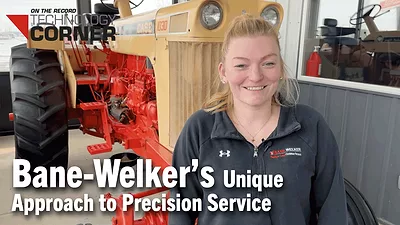I’ve always endorsed the philosophy, “if it ain’t broke, don’t fix it.”
So when our garage door opener recently decided to take a permanent vacation, I temporarily convinced my better half that we could survive with manual operation.
But with a prolonged stretch of subzero weather on its way, I was persuaded to open my wallet and return to the convenience of a push-button operation.
Part of my resistance to fixing the opener was the anticipated agony of picking the right company out of the dozens I found online. Luckily, a chance meeting eliminated the anxiety in this case, and the service I received was impeccable and personal.
Because of that service, I would certainly call on the company again, if needed.
This the same kind of relationship that precision farming dealers seek with their customers. Simply selling a quality piece of hardware isn’t always enough to retain customers, because the market is saturated with displays, receivers and other technology.
Talking with dealers at the Ag Leader Technology event last December, their experience suggests that there’s very little brand loyalty when it comes to precision farming products.
“If customers have a product that works, they tend to want to stick with it,” a precision specialist from Illinois says. “But if another product offers a solution they want at a better price, they’ll probably switch.”
This is vastly different to farmers’ loyalty to farm equipment, although a new report from our editors at Farm Equipment suggests a gradual shift how farm customers define loyalty.
Still, customers don’t have the same history with precision farming technology as they do with a red, green, blue or other colors of farm equipment.
“With machinery, customers still use what their dad and their dad’s dad used,” the Illinois precision specialist says. “Their dad didn’t even have precision farming, so what does it matter?”
This is why dealerships need to distinguish themselves with service, rather than hardware sales. Providing a variety of precision brands gives customers options, but it’s the support behind those sales that will keep them coming back.
“We’re always more focused on the customers’ needs than brand loyalty,” says a precision farming manager in Pennsylvania. “I don’t think it pays to be tied into one brand of precision.”
Of course, offering multiple brands of precision hardware means that specialists need to effectively service each of them. This can certainly be a challenge when a dealership carries 5 or 6 different precision brands, not to mention the variety of models of displays or monitors within those brands.
In the case of the Pennsylvania dealer, he primarily sells 3 different precision brands, but nearly a dozen different displays.
“It’s great to have options, but it puts that much more pressure on us to keep up to speed on everything and make sure we’re providing the highest level service we can provide,” he says.
At the end of the day, it’s worth it because with plenty of precision options, dealers don’t want to give customers a reason to shop around.






